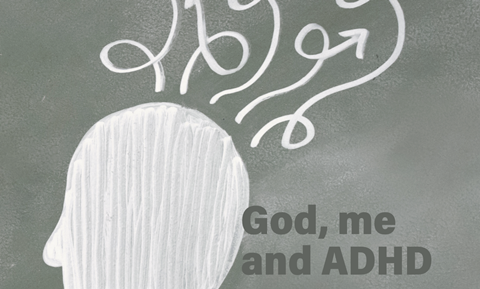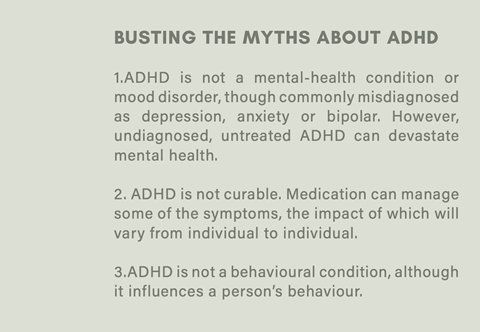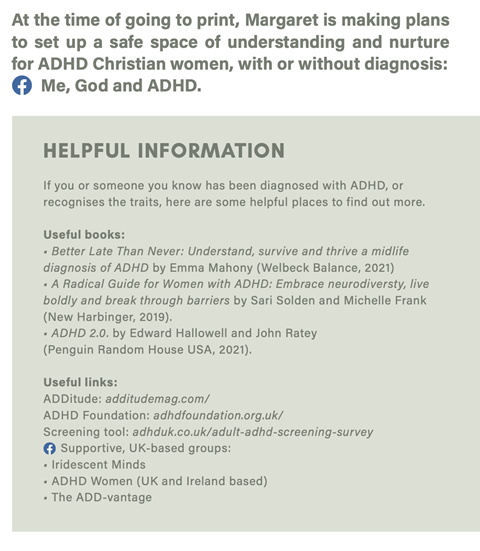Margaret Reed Roberts was diagnosed in her late 40s. Here she describes the unsettling journey it has taken her on

At the age of 48, I discovered I am not who I thought I was. Being diagnosed with ADHD has triggered an existential reconsidering of who I am, and who I am in God.
These days, I am trying to work out how I rise again through our Risen Christ. The weight of oppressive myths and labels, alongside the impact of ADHD itself, is a perpetuating boulder of restriction that stops me from fully becoming who God created me to be.
In a new survey from ADDitude of 1,500 women, in relation to perimenopause and menopause, 94 % reported their symptoms had grown more severe during perimenopause and menopause. The survey revealed, “For more than half of the women, ADHD symptoms grew so severe during their 40s and 50s that they called menopause the period in which”ADHD had the greatest overall impact on their lives”. [Additudemag.com]
I can be exhausted, trapped and isolated by the impact of my brain wiring, reinforced by others’ attitudes. ADHD women can feel invisible, yet God reassures us of our visibility, because “even before he made the world, God loved us and chose us” (Ephesians 1:4, NLT).
What is ADHD?
ADHD is a neuro-developmental condition. This means that some parts of the brain have developed differently, impacting executive functions that enable focus, organisation, planning, prioritising, time management, recall and emotional regulation. Nervous and sensory systems can also struggle.
ADHD is categorised into three types: inattention; hyperactivity/impulsiveness; or a combination of both. It is lifelong, though symptoms can fluctuate over a lifetime, and every individual is different. ADHD is genetic and can occur alongside other neurodevelopmental types such as autism, dyslexia, dyspraxia and Tourette’s syndrome.

ADHD is harder to identify in women and girls, because the effect is more internal and hidden, and due to the fact that the diagnostic criteria are more male focused. This means women can be left without diagnosis, and subject instead to judgement-laden terms such as lazy, chatterbox, chaotic, intense, selfish, hypersensitive.
ADHD brings strengths too. Those of us with ADHD can often be the trailblazers, the entrepreneurs, the big picture, ‘out of the box’ thinkers. We are creative, honest, motivating, empathic, fun, passionate, change-makers.
My early life
From a childhood filled with constant bombardment of thoughts and feelings, I felt alone in my overactive internal world and body. The understanding and caring curiosity that would have changed my experiences and empowered me, were often lacking. I excelled in primary school but was often treated differently by my peers. I was determined, honest, chatty and not one to conform.
Transition to senior school, with its increase of facts and exams, set me on a path of underperformance. Throughout my life, however, I have had a sense of my uniqueness; the person God made me, because of his assurances in Psalm 139:13-14: “For you created my inmost being; you knit me together in my mother’s womb. I praise you because I am fearfully and wonderfully made.”
My teenage years were intense as I navigated my home life and friendships, while having infatuations that I couldn’t make sense of (that’s my ADHD brain with its hyperfocus, apparently), and my first complicated love. Female hormones can have a dramatic effect on ADHD!
Navigating adulthood – and diagnosis
My deep empathy, sense of social justice, desire to empower others and being calm in a crisis, blended wonderfully into my vocation as a social worker. Day-to-day, hundreds of thoughts jostle for my attention simultaneously. Goals and tasks can take huge effort to complete. It is like trying to stop grains of sand from leaking through your fingers while carrying around a giant octopus.
I have spent years wondering what was wrong with me, wondering why so many things seemed so hard for me – especially ordinary tasks. I couldn’t make sense of my spirals of boom and bust, my underperforming or my overwhelm from the mental load of parenting, running a home and some semblance of a career. Feeling a failure, at times I did not want to go on. Shame often exists, due to significant gender normative expectations that I should be able to juggle all these things. My ADHD had also been exacerbated by chronic illness and peri-menopause.
With diagnosis, I received an affirming road map that I have yet to fully orientate with, which scored a sense of discombobulation through me. I am reinterpreting myself and finding a way in the burnout and grief, peeling back the layers to slowly reclaim my gifting and strengths while holding on to God’s promise: “I am he who will sustain you. I have made you and I will carry you; I will sustain you and I will rescue you” (Isaiah 46:4).
I AM NOT ALONE
I grew up not being aware of any women with ADHD. A friend I have known for 25 years suggested ADHD as the root of my struggles and strengths and, from that moment, my lightbulb glowed brightly! I used my hyperfocus skills to find the most supportive online female communities to connect with. They have changed my life and reduced my isolation. I have included details of other women’s stories here to show that, while ADHD can impact in very individual ways, there are also many shared experiences. We do not need to hide our true selves.
Rachel, who is now 33, was diagnosed at ten, struggled at school, felt she didn’t fit in and did not want to conform to expectations.
She experiences hyper-internal activity, explaining she is: “always on the go, driving myself hard…to use up my excess mental energy”. Rachel needs a lot of down time, due to pushing herself to and over her limits.
Good in a crisis, passionate about social justice and a foster parent, Rachel describes herself as “all or nothing”, and feels that “God knew that our different brains were needed, although other people seem not to want to know or appreciate difference.”
Helpful scripture: “I can do all this through him who gives me strength” (Philippians 4:13, NIV).
Heather, 55, was diagnosed at 52, but says she has battled all her life with feeling chaotic, rejected, not fitting in, frequently oversharing and explaining herself.
She describes herself as: “tenacious, easy to talk to, empathetic and compassionate”. She is very analytical and can be strong in a crisis, but “collapse after”.
Getting a diagnosis late in life, also linked to menopause, has been a relief and affirmation for Heather. It has helped her make sense of her lifelong struggles. “Despite all the twists and turns in my life, going down many different paths, I’ve always known God is leading me… pulling me away from bad things. He made me different, because I needed to be different. God made me, me.”
Helpful scripture: “But those who hope in the Lord will renew their strength. They will soar on wings like eagles; they will run and not grow weary, they will walk and not be faint” (Isaiah 40:31, NIV).
Genny, 34, is undiagnosed, but, having spent time finding out about ADHD, found answers to the many questions that she that had pondered all her life, about why and how she felt different: “It just fits like a glove.”
Having drawn closer to Jesus in recent years, through her struggles, Genny has a deeper understanding of her past, present and future.
With this newfound compassion and understanding for herself, Genny feels greater love and understanding for others. “Diagnosis or not, I found answers to who I am.”
Helpful verse: “I’m writing to encourage you to fan into a flame and rekindle the fire of the spiritual gift God imparted to you when I laid my hands upon you. For God will never give you the spirit of fear, but the Holy Spirit who gives you mighty power, love, and self-control” (2 Timothy 1:6-7, TPT).




























